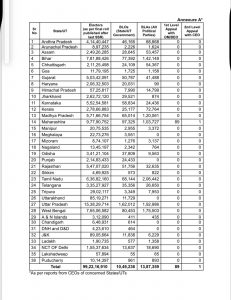ECI highlights accuracy in Electoral Rolls with just 90 appeals nationwide.

ECI highlights accuracy in Electoral Rolls with just 90 appeals nationwide.
Ladakh records flawless SSR with no appeals filed
The Election Commission of India (ECI) has successfully concluded the Special Summary Revision (SSR) of Electoral Rolls across the country, with final rolls published on January 6th and 7th, 2025. This extensive exercise encompassed nearly 10.5 lakh polling booths across 4,123 Assembly Constituencies, marking a significant step in strengthening the electoral process.
Over 13.87 lakh Booth Level Agents (BLAs), appointed by political parties, actively participated in the SSR, reflecting robust stakeholder engagement. In addition, more than 10.49 lakh Booth Level Officers (BLOs) were involved in executing the revision.
The SSR also covered States and Union Territories that held Assembly elections after the 2024 Lok Sabha polls. Following the revision, the total number of registered electors in the country stands at 99.22 crore.
A key highlight of this exercise is the exceptionally low number of appeals filed under Section 24 of the Representation of the People Act, 1950. Nationwide, only 89 first-level appeals were submitted to District Magistrates and District Election Officers, and just one second-level appeal reached the Chief Electoral Officer. This remarkably low figure is a strong testament to the accuracy and transparency of the revised rolls.
The Commission emphasizes that this minimal use of the appeals mechanism underscores the inclusiveness and broad acceptance of the SSR 2025 process. With active involvement from political parties, officials, and citizens, the final electoral rolls are affirmed as accurate and undisputed.
In the Union Territory of Ladakh, a total of 1,90,735 electors are registered. The region is served by 577 BLOs appointed by the UT Government and 1,358 BLAs representing various political parties.
Notably, Ladakh reported no first-level appeals with the District Magistrate or District Election Officer and no second-level appeals with the Chief Electoral Officer—demonstrating an efficient and seamless SSR process in the region.


